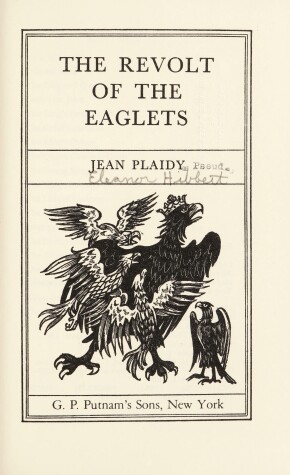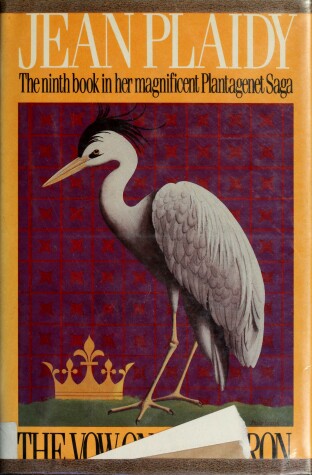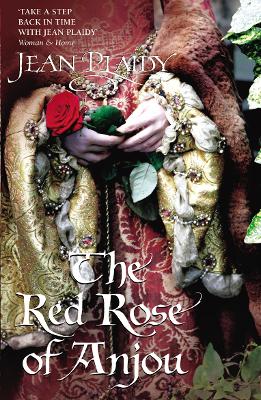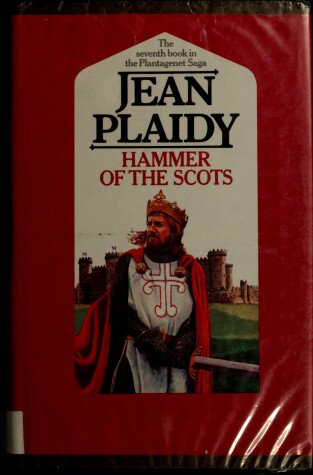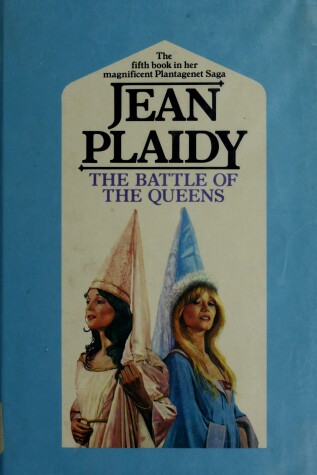Plantagenet Saga
1 primary work • 14 total works
Book 3
When William X dies, the duchy of Aquitaine is left to his fifteen-year-old daughter, Eleanor. But such a position for an unmarried woman puts the whole kingdom at risk. So on his deathbed William made a will that would ensure his daughter's protection: he promised her hand in marriage to the future King of France.
Eleanor grows into a romantic and beautiful queen, but she has inherited the will of a king, and is determined to rule Aquitaine using her husband's power as King of France. Her resolve knows no limit and, in the years to follow she is to become one of history's most scandalous queens.
Richard the Second is losing his hold on the crown and Henry of Bolingbroke, previously exiled by the king, returns to England to claim it. Richard is deposed and dies mysteriously, murdered some say on the orders of Bolingbroke, now King Henry the Fourth. But Henry finds the crown harder to hold onto than it was to win. He is beset by enemies, hampered by disease, and concerned about the rebellious behaviour of his son. Dominating the court and with his eye on the crown is Harry of Monmouth, whose reckless conduct in low-class taverns with his crony Sir John Oldcastle causes scandal. When the king dies, Harry became King Henry the Fifth, and the change is dramatic for both him and Oldcastle. The licentious youth becomes a great king, and Oldcastle, the rake, turns into a religious reformer. Oldcastle dies a martyr and Harry becomes the conquering hero of Agincourt.
The Star of Lancaster is in the ascendant. Harry has brought France to her knees and married her princess. It seems that the long war was at an end. But a greater enemy than the French awaits Harry ...
Richard of Bordeaux, young heir to the throne after Edward the Third, is surrounded by ambitious uncles who believe it would be better for the country if they could take the crown. While Richard shows himself capable of reckless bravery in defeating the Peasants' Revolt, his extravagance soon brings him into conflict with his people. Before long the king's most powerful opponents confront Richard and threaten to depose him.
Here is a vivid picture of Richard's court, his devotion to his favourite Robert de Vere, his love for two Queens, clever Anne and the little Isabella, and of his headlong journey towards disaster. He is determined to take his revenge on the five lords who have humiliated him, but while he succeeds with four of them, the fifth proves to be far more of a challenge. Henry of Bolingbroke, son of John of Gaunt, is clever, subtle and absolutely set on achieving what his father had failed to ...
Edward the Second's first act on coming to the throne is to recall Piers Gaveston from exile, and the new king's devotion to the shrewd and avaricious young man soon becomes a scandal. It is assumed that when Edward marries one of the most beautiful princesses in Europe his inclinations will change, but nothing can make him swerve from his attachment to Gaveston, who is clearly making the most of royal favour.
The new Queen Isabella, accustomed to adulation, is bitterly humilated; and she is not a woman to forget or forgive. With the country in turmoil the king is making enemies throughout the land, and he fails to see that the most deadly of these is his queen.
The untimely death of Richard the Lionheart left his nephew Arthur and his younger brother John in contest for the throne of England. Reluctantly the barons chose John, and so began years of rule by a ruthless and greedy tyrant.
Yet despite his reputation, John, still manages to seduce the young and beautiful Isabella of Angouleme. But in taking her as his bride he makes an enemy for life. And in the tempestuous years that follow many men come to believe that the House of Anjou was tainted by the Devil's blood, the loathsome monarch was himself Evil Incarnate, the very Prince of Darkness...
News of Thomas a Becket's martyrdom has spread throughout Christendom and the blame is laid at the feet of Henry Plantagenet, King of England. Two years later, with Becket canonised, Henry's position is precarious: punished at the Pope's insistence for his part in Becket's death, he now also has an enemy in his Queen, Eleanor of Aquitaine, after her discovery of his longstanding infidelity with Rosamund Clifford. Eleanor is determined to seek vengeance, so, with King Philip of France, she encourages her sons to conspire, both against their father and each other.
Much embattled, the old eagle Henry struggles to fend off both rebellion and the plots of his aggressively circling offspring...
Edward the Second has been barbarously murdered in Berkeley Castle on the orders of his wife, Queen Isabella, and her lover Roger de Mortimer, and fifteen-year-old Edward the Third is now king. Young Edward has already met and fallen in love with Philippa of Hainault and, to prevent him enquiring into the details of his father's death, Isabella allows the marriage to take place. A son is born who goes on to become the famous Black Prince.
While some suggest that Edward has a claim on the French throne, he is reluctant to pursue it, aware of the magnitude of such an undertaking. It is only when Robert of Artois arrives, bent on starting a war with France, that the king is provoked into action. When Robert presents Edward with a dead heron and compares him tauntingly to the timid bird, Edward vows to attack France, heralding the beginning of the Hundred Years' War. Here we see Edward in his greatness, victorious in war and leading his country to prosperity, and at his very weakest, fallen from glory and crippled by his scheming mistress.
Reckoned by those about him to be the most handsome man in the country, Edward the fourth has risen to the throne with the help of Warwick, the kingmaker. But even Warwick's trusted advice cannot convince the King to ignore his passion for the beautiful widow, Elizabeth Woodville - and when she refuses to become his mistress the two are married.
Beloved of the people, Edward proves himself to be a strong king, but his love of luxurious living soon begins to impact on his royal duties. Despite his mistresses, Elizabeth is loyal to the illustrious king, providing him with many children, among them Edward the fifth and Richard Duke of York. But Edward lived recklessly and on his death an incident from his past comes to light that will change the course of history ...
When Henry VI becomes king, it is soon clear that he would be better suited to a quiet life than to ruling the country. Richard, Duke of York, is convinced that he would make a better king and has more right to the crown, and he will stop at nothing to claim it. But Margaret of Anjou, Henry's new French wife, is a formidable woman who is just as determined to keep Henry on the throne.
Most powerful of all is the Earl of Warwick, the kingmaker, and with his support of Richard of York the War of the Roses begins. When Henry VI lapses into madness and eventually meets his mysterious end in the Wakefield Tower, Margaret directs all of her ambition towards her young son, Passionate and impulsive she begins scheming for him, and in doing so dashes headlong into disaster ...
On the death of Henry the fifth, a nine-month-old baby is made King of England. Ambitious men surround the baby king, including his two uncles, the Dukes of Bedford and Gloucester. Shrewd and clever, Bedford seeks to uphold all his late brother had won and preserve it for young Henry the sixth. Gloucester, a man of poor judgment, greedy for wealth and power, has other ideas.
In Lancastrian England and war-torn France, there are three women whose lives are to have a marked effect on the future. Katherine de Valois, haunted by an unhappy childhood, finds love in an unexpected quarter and founds the Tudor dynasty; Joan of Arc leaves her village pastures on the command of heavenly voices; and Eleanor of Gloucester is drawn into a murder plot and becomes the centre of a cause celebre. Murder, greed and ambition flourish alongside sacrifice, dedication and courage. These are turbulent times as the defeated become the victorious...
Marguerite, eldest daughter of the Count of Provence, had married a king of France - and now her sister Eleanor is determined to make just as grand a match.
Good fortune and wily cunning bring her Henry of England. A good and generous husband but a weak king, he rules a nation that still remembers his cruel and foolish father, King John. As Henry showers gifts on his new bride his extravagance forces him to levy ever greater taxation on the land, and the spectre of revolt soon looms against him. For Simon de Montfort, the adventurer who will give England its first true parliament, the house of destiny is at hand.
The news of Henry III's death reached his son Edward on the long road home from the Holy Land. Now he was England's king and a man fit for his destiny.
Through all the years of his reign, through stark personal tragedy and chill forebodings as his son grew into a weak, corrupted price, Edward I strove to weld a nation united from England, Scotland and Wales.
When the mighty Wallace raised the Scots in arms and the Welsh Llewellyn strove for power, Edward stood firm to his resolve, still knowing in his heart how much would be lost when his crown passed down to his dissolute son ...
The first half of the thirteenth century is dominated by two women, as proud and ambitious as they were beautiful, yet different in all other qualities.
Isabella, flamboyant and passionate, a medieval Helen of Troy - wife to King John and mother to Henry III...
Blanche of Castile, serene and virtuous Queen of France, wife of Louis VIII and mother of Louis IX...
The two women hated each other on sight. Isabella would stop at nothing, not even murder, in her passion to destroy the French Queen...

